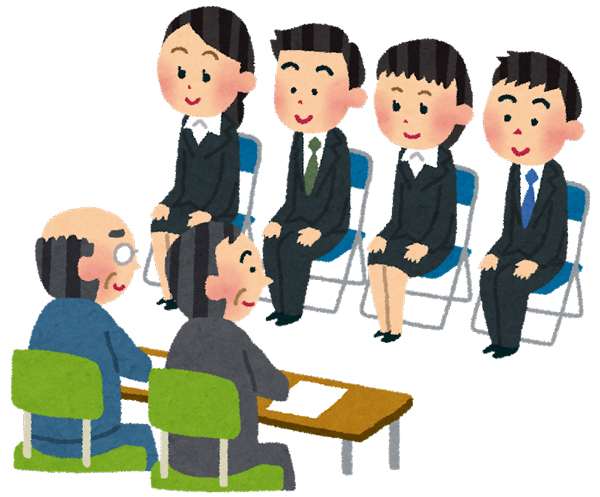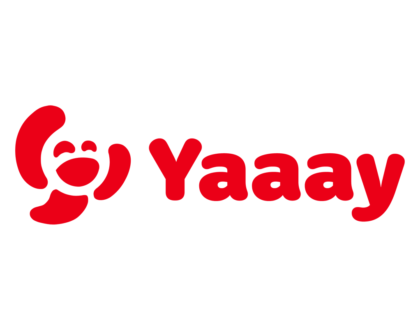Japanese Group Interviews – How to Stand Out from the Crowd

by Madelaine
Mastering group interviews is essential for your job search. They take place before individual interviews, so if you fail here you lost your chance to get the job.
You may have seen group interview scenes before in Japanese movies or books, but otherwise, they are barely covered in English.
So let’s clear things up, shall we? To get to the next interview stage, first, learn about the difference between group interviews and group discussions. Then, find out what things to look out for. Lastly, understand what to prepare for group interviews.
コンテンツ
What are group interviews?
Group interviews, called グループ面接 (ぐるーぷめんせつ) or 集団面接 (しゅうだんめんせつ) take place at the beginning of the selection process and are conducted in small groups of around 5 people.
Group interviews might seem easier than individual ones since you won’t have that many questions to answer, but the opposite is true.
With only a short time window available, you have to make your answers count and know how to leave a lasting (good) impression in a short amount of time.
Sometimes one or two people get asked all the questions, while the other participants barely get any chance to speak. If that happens you have already lost. Avoid this by preparing a suitable self-introduction in which you advertise yourself to the company.
Even though it’s a group interview, prepare just as thoroughly as you would for a normal job interview.
READ ON All you need to know about group discussions.
By the way, group discussions are a completely different matter from the group interviews discussed here. In group discussions, candidates are asked to engage and discuss among each other and the interviewers are only taking an observer role, assessing the skills and personality of each participant.
Strategies
Group interviews are particularly common as the first interview at big companies. The focus here is on your communication skills. Particularly, how well you understand questions, your consideration toward other people, and your ability to answer in a simple and to the point fashion.
Now, as a non-native speaker this bar seems quite high, but focus on using clear language and follow the advice below.
Impactful Self-Introduction
Since you are not the only one there, your self-introduction must be spot on and should not take more than 60 seconds. Generally, though, it is similar to normal job interviews, and regardless of what you say keep in mind to speak in a loud and clear voice.
- Introduce yourself with university, faculty, major, and full name.
- Outline what you are studying at university.
- Point out your strengths and other skills that set you apart.
- Explain your motivation for joining the company.
- Finish with 「本日はよろしくおねがいいたします」for a good impression.
Good First Impression
With that many people, the first impression is even more important than usual. Don’t let an opportunity slip through your fingers, just because you didn’t take 5 seconds to double check yourself in a mirror before entering the building (try train stations or convenience stores).
- Hair (and makeup), and hands are clean and neat.
- Clothes are clean, wrinkle-free and sit properly.
- Maintain a straight posture from the moment you enter the building.
- Speak in a clear and loud voice.
- Look people in the eye and be polite.
Keep it simple
Interviewers, as well as other candidates who listen to you, will be grateful if you can keep your stories short and to the point.
- Start from the conclusion (PREP).
- Keep your answers under 90 seconds.
- Talk only about main points, skip the details.
Following these rules will help you to clearly get your points across. Right from the start, your audience will know what you are talking about, and they are less likely to get distracted by the itching in their left foot or minor details.
Listen to other Candidates
You might be asked questions that check whether you are paying attention to the stories of other candidates. Even if you are not asked anything, interviewers may observe whether you relax once your questions are over or if your body language shows that you are actively listening. Your interview isn’t over until you left the premises, so stay alert and slightly turn toward whoever is talking.
Focus on Yourself
At group interviews, candidates are put together randomly. Being grouped together with people having a higher degree or more work experience, or other traits that can seem intimidating is not uncommon.
Often, what happens here is that people give up from the start, thinking they don’t stand a chance. But ask yourself. If you don’t believe in yourself, how do you think you are going to make the interviewer believe in you?
Avoid comparative statements like “as X already said,” they can lead to a negative evaluation and won’t help you feel better. Just forget about the others and focus on conveying your skills and strengths, after all, you applied because you have what it takes for the job.
Mind your Manners
As with other interviews, how you enter and leave the room, how you interact with people, etc. plays a great role in your evaluation. Since you are not alone, it is unavoidable that you will be compared, so make sure you learn the basics.
- The first person knocks on the door three times.
- Others follow while holding the door.
- The last person closes the door quietly.
- Inside, friendly greet with 「しつれいいたします」.
- Don’t sit down until the interviewer gives the signal.
- Place your bag parallel to the legs of the chair, put your folded coat on the bag.
- At the end, get up and stand next to your chair and greet.
- The person closest to the door leaves first.
- Bow slightly when entering and leaving.
Common questions
The following questions are the most common during group interviews. Prepare answers to these questions in advance and practice them. If you think about these questions early enough you can also use the answers for you entry-sheet or resume.
- Please introduce yourself.
- As a student, what did you work hard on?
- What was the most difficult challenge/experience as a student?
- Why did you apply?
- Tell us about your strengths and weaknesses.
This is all you need to know about the specific requirements of group interviews. Take a look at our other articles, if you want to know more about interview strategies and manners in general.






